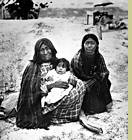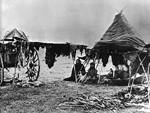 |




|

 Chipeta (1843-1924)
Chipeta (1843-1924)
Born in 1843, Chipeta grew up near present day Conejos, Colorado. She was a member
of the Uncompahgre (also known as the Tabeguache) tribe, one of seven Ute tribes. At sixteen she married Chief Ouray, the main treaty
negotiator for the Uncompahgre Utes. Ouray was a skilled negotiator, and both he and Chipeta befriended white settlers.
In 1879, a group of White River Utes killed eleven men, including Indian agent Nathan Meeker, at the White River agency in
northwestern Colorado. Several women and children were taken hostage and held for twenty-three days. Oral history suggests that Chipeta
had a role in rescuing and housing the hostages.

While Chipeta and Ouray were not part of the Ute band involved in the
Meeker Massacre, they traveled to Washington, DC, to help negotiate a treaty with the United States government. The Utes ratified the
treaty but the U.S. government did not agree to allow the tribes to stay in Colorado. Instead, the tribes were moved to the Uintah
Reservation in Utah. Ouray died there in 1880. Three years later, Chipeta remarried and later adopted four children. She died in 1924
on the reservation in Utah. Her body and Ouray's were re-buried in 1925, in Montrose, Colorado.
The experience of Chipeta's Ute
tribe mirrors the experience of Native Americans in the West. By the 1850s the U.S. government's policy increasingly
became one of displacement of Native Americans to specific locations or reservations, often far away from their ancestral lands.
|

 |






